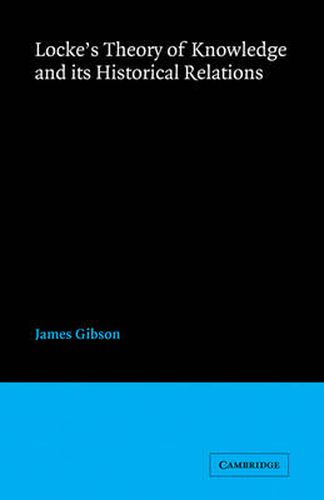Readings Newsletter
Become a Readings Member to make your shopping experience even easier.
Sign in or sign up for free!
You’re not far away from qualifying for FREE standard shipping within Australia
You’ve qualified for FREE standard shipping within Australia
The cart is loading…






John Locke is probably one of the highest-regarded English philosophers, and the first of the British empiricists. His ideas on the mind and consciousness have continued to resonate throughout philosophy and philosophical thought ever since An Essay Concerning Human Understanding first appeared in 1690. James Gibson’s Locke’s Theory of Knowledge and its Historical Relations was first published in 1917, and saw its fourth reprinting in 1968. Here, it is made available for the first time in paperback. This hugely detailed work is an invaluable collation of Locke’s theories, exploring his thoughts on the problems of knowledge, the formation of ideas, causality and the self. Furthermore, Gibson also provides an in-depth historical evaluation of the effects of these theories on contemporary philosophy as a whole, and on thinkers such as Descartes, Kant and Leibniz more specifically. As such, this book is a valuable reference work for any student of philosophy.
$9.00 standard shipping within Australia
FREE standard shipping within Australia for orders over $100.00
Express & International shipping calculated at checkout
John Locke is probably one of the highest-regarded English philosophers, and the first of the British empiricists. His ideas on the mind and consciousness have continued to resonate throughout philosophy and philosophical thought ever since An Essay Concerning Human Understanding first appeared in 1690. James Gibson’s Locke’s Theory of Knowledge and its Historical Relations was first published in 1917, and saw its fourth reprinting in 1968. Here, it is made available for the first time in paperback. This hugely detailed work is an invaluable collation of Locke’s theories, exploring his thoughts on the problems of knowledge, the formation of ideas, causality and the self. Furthermore, Gibson also provides an in-depth historical evaluation of the effects of these theories on contemporary philosophy as a whole, and on thinkers such as Descartes, Kant and Leibniz more specifically. As such, this book is a valuable reference work for any student of philosophy.